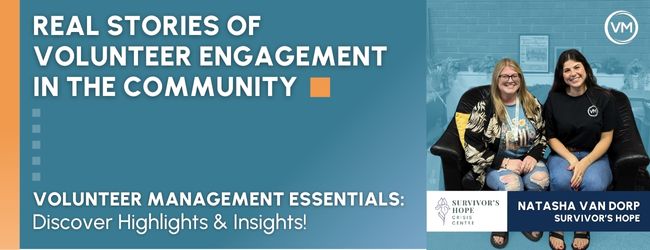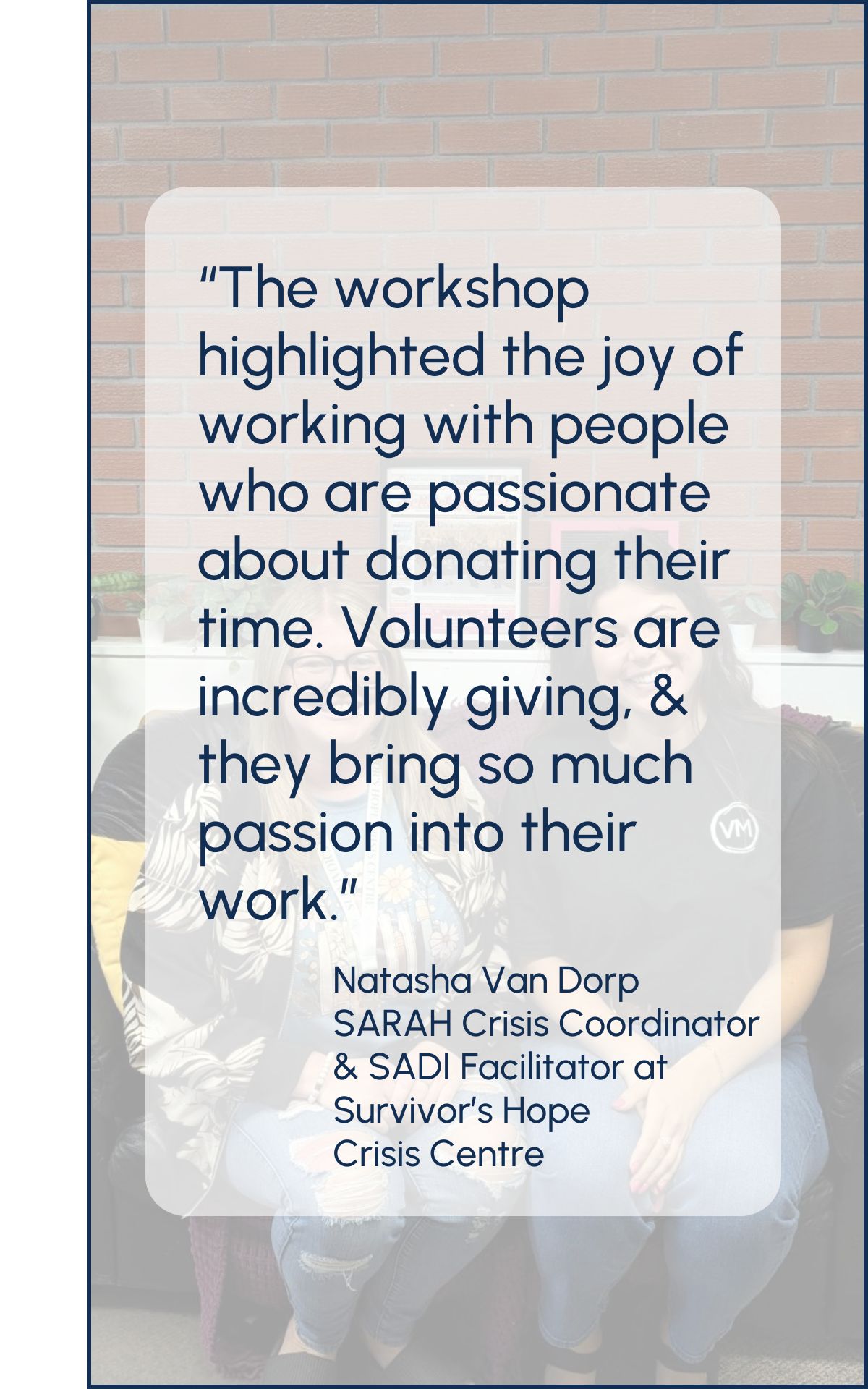Behind the Scenes: Real Stories of Volunteer Engagement in the Community - Part 2
-
October 3, 2024
Posted by: Kamillah El-Giadaa
 Our Behind the Scenes: Real Stories of Volunteer Engagement in Community series is to showcase the amazing work volunteer engagers do in our community!
Our Behind the Scenes: Real Stories of Volunteer Engagement in Community series is to showcase the amazing work volunteer engagers do in our community!
From engaging new volunteers to improving program efficiency, these stories highlight the real impact of our workshop and the vital role volunteer engagers play in our communities.
Natasha Van Dorp serves as the SARAH Crisis Coordinator and SADI Facilitator at Survivor's Hope Crisis Centre. She also coordinates community engagement and volunteer recruitment, a role that has expanded significantly post-pandemic. When Natasha started, there were only 10 volunteers, but through her leadership, they now have a thriving team of 21.
Volunteers play a crucial role at Survivor's Hope, offering support to survivors through the SARAH Crisis Program. With 40 hours of training, these volunteers come from various walks of life-university students, retirees, and community members seeking deeper engagement. Many volunteers have lived experience, bringing empathy and understanding to their work.
Natasha reflects on the personal growth and value that comes with managing volunteers for the first time, noting how essential it is to invest in volunteers to create a strong, committed team.
Q: What is Survivor's Hope? 
A: Survivor's Hope started 21 years ago in Pinawa and serves as a Sexual Crisis Resource Centre. We have three different programs: the SARAH Crisis Program, counseling, and the Sexual Assault Discussion Initiative (SADI). Through the SARAH Crisis Program, volunteers provide support to survivors by responding to calls from hospitals and the RCMP. These volunteers sign up for shifts based on their availability and have 40 hours of training. Once dispatched, they meet survivors in person to offer guidance, present available options, and empower them. This person-focused support is key to helping survivors through their trauma.
Currently, we have 21 volunteers, which allows us to cover a full schedule. For three years, due to COVID-19, volunteers were not permitted in hospitals or with the RCMP, but now having a strong roster alleviates pressure on the staff.
We also provide ongoing counseling to over 300 individuals who have experienced sexual abuse.
School Workshops
In addition to SARAH, we run SADI, a school-based initiative where we deliver workshops to students in Grades 6, 8, and 10. Each session is tailored to the age group and covers essential topics like understanding behavior, healthy relationships, boundaries, and consent. These workshops fill a crucial gap that teachers might not have time to fully cover.
We are active in three different school districts across Interlake-Eastern Manitoba, which is our primary area of operation in partnership with the Interlake-Eastern Regional Health Authority.
Q: What is your role at Survivor's Hope?
A: I am the SARAH Crisis Coordinator and SADI Facilitator. I also oversee community engagement and volunteer coordination. When I first started, we only had 10 volunteers due to the impact of COVID-19. Now, we have grown to 21 volunteers, which has been a big improvement.
Q: What role do volunteers play at Survivor's Hope?
A: Our volunteers are a vital part of the SARAH program. They support survivors at RCMP detachments and hospitals. Each volunteer receives 40 hours of training, and many of them have lived experience. We have a wide range of volunteers-from university students to retirees, and community members looking to get more involved and give back.
Q: How long have you been engaging volunteers in your career?
A: Prior to this, I did a lot of volunteer work at the Petersfield Curling Club, where I taught kids and participated in various roles. However, this is my first time coordinating and running a volunteer program.
Q: What did you find most valuable about the Volunteer Management Essentials workshop?
A: The workshop taught me that volunteers can come from anywhere, and building a strong volunteer team takes time. Investing in your volunteers is crucial because they are what drive the organization forward. I've also realized that there are many different ways to recruit volunteers, and it can take 7-8 months to bring someone on board.
We've also gotten rid of minimum time requirements, which has allowed us to be more flexible. The workshop reassured me that our practices were on the right track, but it also gave us new ideas-like improving interview questions, partnerships with organizations like the Folk Festival, and creating an environment full of respect and positive culture.
Q: What advice would you give to someone attending this workshop for the first time?
A: Go in with an open mind and think critically about your program. Consider what your organization is giving back to your volunteers, and reflect on what more can be done. What you provide to your volunteers is what they will give back to you.
We also hold monthly gatherings with our volunteers for organizational updates, education, and getting to know each other better. We had an in-person meeting in May, and it was great-everyone loved it!
Q: How has this workshop changed your perspective on volunteer management?
A: The workshop highlighted the joy of working with people who are passionate about donating their time. Volunteers are incredibly giving, and they bring so much passion into their work.
Thank you, Natasha!
Thanks to Natasha, at Survivor's Hope Crisis Centre, for taking the time for the interview! It's always interesting to hear how the Volunteer Management Essentials workshop impacted the work volunteer engagers do.
Register for the Volunteer Management Essentials workshop here!

